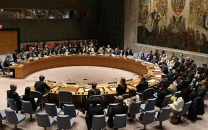Bettor’s paradise
The 2011 iteration of the cricket World Cup promises to be a batter’s and bettor’s paradise.

In Pakistan, gambling and cricket have always gone hand-in-hand. Add them up and the answer is corruption. The stories that catch mainstream media attention are those of the big, bad gambling syndicates in India and Dubai. Stories abound of shady men in shades handing stuffed envelopes to susceptible cricketers. Illegal cricket betting, we are told, is a multi-billion dollar industry and it invariably leads to spot-fixing, match-fixing, bought-off cricketers and the end of sport as we know it.
Granted, this scary world of mafias and crooked players exists and, given how impenetrable it is, it’s not surprising that reporting on it is sketchy and sensationalist. But a second, smaller gambling world exists; one where the amounts bet are smaller, though still considerable. As with everything else in Pakistan, even the society of gamblers is stratified. There are the tycoons, barons and industrialists whose individual bets run into the millions of rupees. Then there is the salaried class, which is just looking to add an extra kick to the enjoyment of watching a cricket match.
It was the latter, slightly more opaque, incidence of gambling that I decided to explore during the World Cup.
The perfect opportunity presented itself after England’s last gasp victory over minnows Netherlands in the early stages of the tournament. England’s bowling attack, so fancied before the competition began, was ravaged by the Dutch batsmen. Despite the narrowness of the victory, given the structure of the tournament England was sure to make it to the quarter-finals (this was before they lost to Ireland) and so were still worth a flutter.
The process of placing a bet on England turned out to be quite cumbersome. It began with an introduction to a representative of a bookie. The scion of a feudal family, this representative wasn’t a bookie himself; he just handled transactions, gave odds and provided information on how to deposit and collect money. He was never seen or heard since all communication with him takes place through SMS.
The afternoon after the England-Netherlands match, I asked him what the odds on England winning the World Cup were. The terse reply simply stated, “7-1”. After being told the odds were acceptable, he explained the next step. I was provided the name and address of a woman in the Philippines, along with the name and location of an employee at a commercial establishment who would handle the money transfer.
Ten minutes later, I got another SMS. This one gave more instructions. “Ask him for the yellow form. On another paper write England, 7-1 and the bet amount.” He further said that bets could be a minimum of $100 and a maximum of $3000 and an additional 10 per cent fee would be added for the employee handling the transfer. Although the money is transferred to the Philippines in dollars, the payment would be made in rupees. Including fees, a $100 bet would end up costing more than 9000 rupees.
There was no indication that the shop was a hub of illicit activity. There were everyday customers going about their everyday business. In truth, the place had a whiff of amateurism to it. The one thing that you do not expect when placing an illegal bet is to get a receipt. Yet there it was, a copy giving the name of the person the money had been sent to and the amount wagered. It’s doubtful that the document would be legally binding but it was nonetheless reassuring to get documentary evidence of the transaction that has just ensued.
While the gambling scene in Pakistan is a fascinating sub-culture, most people are interested in it only in how it relates to foul play in cricket. The relatively small-scale operators, who deal in the tens of thousands rather than tens of millions, do not have the financial muscle to buy off players. The world of high-stakes gambling is far more hermetic and an introduction to it requires a net worth of eight or nine figures and a dizzying array of introductions and contacts.
I was, however, able to speak to a person who exists in the margins of this high-rolling existence. As an acquaintance of a big-time bookie and someone who has dabbled in taking bets himself, he was familiar with some of the more unsavoury dealings in this shady world.
He was unwilling to speak about how high-stakes bookies operate but did agree to talk, off the record, on the ways in which cricket matches can be fixed by those who have access.
So far, there have been two matches at the World Cup that have led to some chatter and suspicion. The first was Australia’s routine win over Zimbabwe, which sent tongues wagging because of the painfully slow progress of Australia’s openers. Shane Watson and Brad Haddin, two batsmen who are among the faster scorers in world cricket, crawled along at a run rate of less than three an over for the first 10 overs of Australia’s innings. This led to some gossip, which Haddin strenuously denied, that they might have been paid off to score slowly at the start of the innings.
The second suspicious match was England’s tie with India. Former Australian leg spinner Shane Warne was also called out by paranoid minds for predicting a tie on Twitter before the match began.
While he had no specific knowledge of the matches in question, my source explained how it was far more plausible that bookmakers would exert the sort of influence that would lead to a certain player changing the way he plays for a portion of an innings than two teams colluding to guarantee a certain result.
He said, “There is no bookie on this planet who can buy 22 players and get them to tie a match. There is too much randomness in cricket for this to work out.” If the amounts given to Salman Butt, Mohammed Aamir and Mohammed Asif for their spot-fixing is a good barometer of the going market rate for buying off corrupt players, then fixing the India-England match would have required a bookie to shell out north of two million pounds. By contrast, he said, paying two players to adjust their performance for an hour or two is eminently doable for those who have the money, wherewithal and influence. This is not to say that the Australian openers are guilty of corruption; simply that that scenario is far more plausible.
For over a decade now, cricket has been rocked by multiple match- and spot-fixing scandals. Using the smoke and fire theory, fans have now become so cynical that anything seemingly out of the ordinary is a sign of foul play. Given the glorious uncertainty of sport, this World Cup is bound to throw up many other shocks. That many of these results will be associated with bookmakers’ influence shows just how profoundly gambling has shaped the cricket world today.
Headingly 1981
This legendary Test match is best remembered for Ian Botham’s remarkable innings that took England to one of cricket’s most unlikely victories. What is less known that is that Australians Dennis Lillee and Rod Marsh got a third party to place a small wager on an England victory when they found out the odds of that happening were 500-1. At the time, match-fixing and gambling were not on anyone’s radar and the incident was laughed off.
Saleem Malik
It is not known exactly how many matches Saleem Malik fixed, but it was a not insubstantial number. He was first accused by Australians Shane Warne, Tim May and Mark Waugh of offering them money to throw a Test match in Karachi in 1994-95. He denied that charge but persistent rumours of corruption in the Pakistan team lead to Justice Qayyum carrying out the first in-depth investigation into match-fixing in Pakistan. His report recommended life bans only for Malik and Atta-ur-Rehman but much of the 1990s team was fingered for its involvement
Shane Warne and Mark Waugh
Ironically, two of Malik’s accusers had also taken money from bookies. It was revealed in 1998 that the pair had given what, according to them, was pitch and weather information to an Indian bookmaker several years earlier. The Australian cricket board fined Warne and Waugh secretly and hushed up the matter.
Hansie Cronje
In 2000, South African captain Hansie Cronje was caught red-handed when tapes surfaced of his conversations with Indian bookmakers. After an initial denial, Cronje admitted to providing information and fixing matches for money and was given a life ban. He also offered money to teammate Herschelle Gibbs to underperform. Cronje died in a plane crash in 2002.
Mohammed Azharuddin and Ajay Jadeja
After Cronje revealed that Indian skipper Mohammed Azharuddin had introduced him to the gambling mafia, authorities in India investigated the batsmen and eventually said that he had played a significant role in the rise of illegal bookmakers in the country. Batsman Ajay Jadeja was also implicated. Azharuddin was handed down a life sentence while Jadeja was given a five-year ban.
Marlon Samuels
Although the exact nature of his transgression was never revealed, West Indian batsman Marlon Samuels was given a two-year ban in 2008 for receiving financial compensation in a manner that would bring the game into disrepute.
Salman Butt, Mohammed Aamir and Mohammed Asif
A sting operation carried out by British tabloid News of the World revealed that the three Pakistanis took cash to deliberately ball no-balls in a Test match against England. All three were adjudged guilty by an ICC tribunal and given five-year bans with Butt and Asif being given additional suspended sentences.
Published in The Express Tribune, Sunday Magazine, March 20th, 2011.



















COMMENTS
Comments are moderated and generally will be posted if they are on-topic and not abusive.
For more information, please see our Comments FAQ